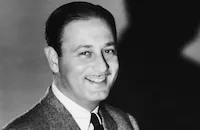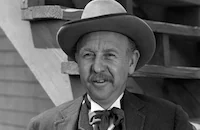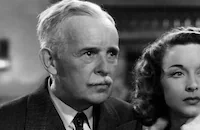Paris Calling
Cast & Crew
Edwin L. Marin
Elizabeth Bergner
Randolph Scott
Basil Rathbone
Gale Sondergaard
Lee J. Cobb
Film Details
Technical Specs

Synopsis
During a dinner party at her family home in Paris, Marianne Jannetier is warned by her politician fiancé Andre Benoit, that the city is about to be overtaken by the Germans, and that she and her mother must make their way immediately to Bordeaux. Along with hundreds of others that night, Marianne and her mother evacuate Paris, but are caught in a German bombing raid. Marianne's mother dies of a heart attack, so the distraught young woman decides to return alone to her Parisian home. Meanwhile, a young German pilot, unwilling to kill innocent French women and children with his bombs, abandons his plane and parachutes into France. The German soldier is mistaken for a British flyer by Lt. Nicholas Jordan, a Texan flying for the British Royal Air Force, and his British gunner, Bruce McAvoy. Nick takes the young German prisoner, but is later forced to land his plane in the French countryside. In the meantime, the British are compelled to evacuate France, with Nick and McAvoy being inadvertently left behind. Marianne returns to Paris to find that a French underground meeting is being held in her home as German soldiers march into the city. She joins the underground, and is sent to work as a pianist at La Coquine, a waterfront café, where she sends coded radio messages through the piano. In the meantime, Nick and McAvoy discover a German air fleet hidden in some stacks of hay. They set fire to the bales, which signals a British aerial attack. McAvoy is killed, however, as the two attempt their escape. At the same time, Gestapo agents trace short-wave radio messages to La Coquine, so their commander, Hauptman Schwabe, goes there to investigate. Nick arrives at the café a short time later, and he immediately comes under Schwabe's suspicion. The Gestapo officer, rather than arresting everyone, decides to keep the café and Nick under close observation. While Marianne wants to help Nick, both bartender Mouche and café proprietor Colette suspect him of being a double agent. The next morning, the head of their underground unit, Professor Marceau, orders the café workers to turn Nick over to the Germans. Just as the Gestapo arrives, however, Marianne realizes that Nick is really an American and hides him, and then the two are taken prisoner by Marceau. After being questioned by the chief of the underground, Marianne learns that Andre is now a high-ranking Nazi sympathizer within the Vichy government, and she is ordered to spy on her ex-fiancé. While Andre and Marianne are reunited in a hotel suite, Schwabe arrives and demands Andre's secret papers. When the French politician refuses, Schwabe insists on leaving his counterfeit papers behind, as a "mouse trap" in case Marianne is truly a spy. Later that night, Marianne falls for the "bait," and she is discovered by Andre, who then defends his association with the Nazis in hopes of convincing her to join him. When he threatens to turn her over to the Gestapo if she refuses, Marianne kills Andre with his own gun. As she makes her escape, a captured Nick is interrogated by Schwabe, who then learns of Andre's assassination. Unable to gain admittance to underground headquarters, Marianne goes back to La Coquine, where she is met by the just-escaped Nick. As the Gestapo surrounds the café, Marianne sends a message to London requesting assistance. A British commando unit is then sent to the Paris waterfront in a captured German transport. They arrive at the café just as Schwabe and his men are placing Marianne and the others under arrest. Marianne, Nick and the other underground agents, along with the captured German officers, then board the seaplane and fly back to London and freedom.

Director

Edwin L. Marin
Cast

Elizabeth Bergner

Randolph Scott

Basil Rathbone

Gale Sondergaard

Lee J. Cobb

Charles Arnt

Edward Ciannelli

Elisabeth Risdon
George Renavent
William Edmunds
Patrick O'malley
George Metaxa
Paul Leyssac
Gene Garrick
Paul Bryar
Otto Reichow
Adolph Milar
Marion Murray
Grace Lenard
Yvette Bentley
Marcia Ralston
Pedro De Cordoba

Jeff Corey

Ian Macwolfe

Rosalind Ivan
Mary Forbes

Howard Hickman
Ed Emerson
Harlan Briggs
Denis Green
Charles Wagenheim
Craufurd Kent
Fred Vogeding
Philip Van Zandt
Norma Drury
John Bleifer
Pete Sosso
Jean Del Val
Roland Varno
William Ruhl
Douglas Grant
Eric Lonsdale
John Meredith
Jacques Vanaire
Eugene Borden
Arno Frey
Hans Von Morhart
Gene O'donnell
Dick Alexander
Lester Dorr
Alphonse Martell
George Cathrey
Kenneth Nolan
Eric Alden
Eddie Dew
Hans Fuerberg
Joe Kamaryt
Marty Faust
Crew
Bernard B. Brown
Edward Curtiss
Charles K. Feldman
Fred Frank
R. A. Gausman
Benjamin Glazer
Benjamin Glazer
Richard Hageman
W. R. Heymann
Ray Hoadley
Charles S. Kaufman
Milton Krasner
Jean Negulesco
Martin Obzina
Jack Otterson
Madame Pola
Robert Pritchard
H. J. Salter
John S. Toldy
Vera West

Film Details
Technical Specs

Quotes
Trivia
Notes
Actor Paul Leyssac's name was misspelled in the credits as "Leysaac." This was the first film made in America by noted European stage and screen actress Elisabeth Bergner, whose name is spelled "Elizabeth" in the onscreen credits. Hollywood Reporter reported in June 1941 that actor Broderick Crawford was to star in this film, but he did not appear in the released film. An August 1941 Hollywood Reporter news item reported that the music score was to be composed by Frank Skinner, but it has not been determined if any of his work was used in the released film.
The Charles K. Feldman papers at the AFI Louis B. Mayer Library reveal the following information about the production: the film was put together under a four-way agreement between Bergner, producer-writer Benjamin Glazer, director Edwin L. Marin and the Feldman-Blum Corp, a talent agency. The Feldman-Blum Corp. owned the screenplay, having purchased its rights from Glazer as well as from writers John S. Toldy, John Collier and Lou Sarecky. Neither Collier nor Sarecky received any screen credit for their work on the screenplay, however, and it has not been determined if any of their work was used in the released film. Feldman's initial efforts to set up the project at Universal were unsuccessful, as noted in a Universal memo, which stated that, as of June 1941, the studio was unable to secure bank loans to produce a film starring Bergner. In a related correspondence, Joe Seidelman, foreign sales manager of Universal's London office, warned the studio of the inability to sell Bergner films in England, because, in part, she walked off the set of the British film 49th Parallel. Seidelman then referred to Bergner as "box-office poison...as bad as (Katharine) Hepburn was in your country once." Feldman then tried to move the project to Columbia, but that studio rejected the script outright. The project then returned to Universal, where it was put into production in July 1941.
Under a July 30, 1941 agreement between the partners, Universal was to pay the film's negative costs. The partnership would then receive fifty per cent of the film's net profits. The agreement also explained how these profits were to be divided among the partners: Marin would receive the first $5,000 (which he had been advanced prior to production); Bergner would receive the next $50,000; the following $45,000 would be split evenly between Glazer, Marin and Feldman-Blum; the next $10,000 would be split between Glazer and Marin; Glazer would receive the next $30,000; and all profits beyond this would be split as follows: 25% for Bergner, 25% for Feldman-Blum, 10% for Marin and 40% for Glazer. In addition, Feldman-Blum was to receive a 10% agent's commission on all payments to Bergner, Marin and Glazer.
The Feldman papers note that, as of September 14, 1942, the film had amassed a worldwide gross of $409,127. Universal accounting, however, claimed that the film had generated only slightly more than $90,000 in net profits, this despite earlier memos which estimated the film's negative costs at $140,000 (including Marin's $5,000 advance). By 1942, the partnership and Universal had reached a settlement on the profits to that point, and the partnership was paid $105,000, which was split $40,000 for Bergner, $35,000 for Glazer, $15,000 for Marin and $15,000 for Feldman-Blum. As of January 17, 1949, the film had generated a worldwide gross of $895,652, with the partnership receiving approximately $159,000. This led to yet another dispute, as partners Bergner, Glazer and Feldman-Blum had hired public relations expert Henry C. Rogers to promote the film during its initial exhibition in the United States. In 1953, Rogers complained to Feldman that he too was entitled to a percentage of the partnership's profits under his agreement with them, yet he had received no such money despite the fact that he had learned that Feldman-Blum had received over $51,000 from Universal for its participation in the film. The Feldman papers do not, however, show any evidence of a settlement between the partners and Rogers in this dispute.
Randolph Scott, who was not a part of the partnership, was paid $4,375 per week, with an eight-week guarantee. The Feldman papers also state that writer John S. Toldy was paid $4,000 for his work on this film, and that the partnership of Bergner, Glazer and Feldman-Blum agreed to give writer Lou Sarecky a $1,000 bonus for his work on the screenplay. According to an AMPAS inter-office memo, Glazer also wrote the original story for this film; "however, due to legal, contractual and extra-mural obligations as well as much hair-pulling, name-calling and pouting, it was decided that Glazer had his name on the screen enough times as associate producer and as screenplay writer..." This was in direct contradiction to Glazer's contract of July 29, 1941 with Feldman.












